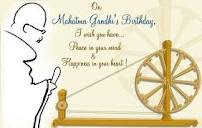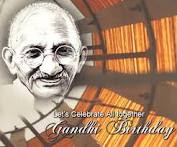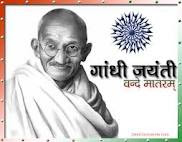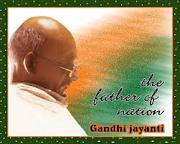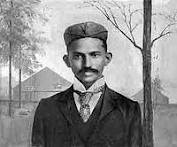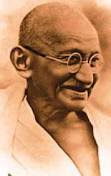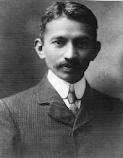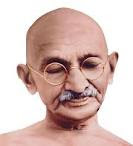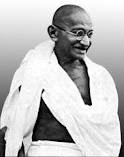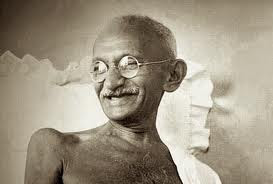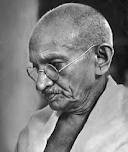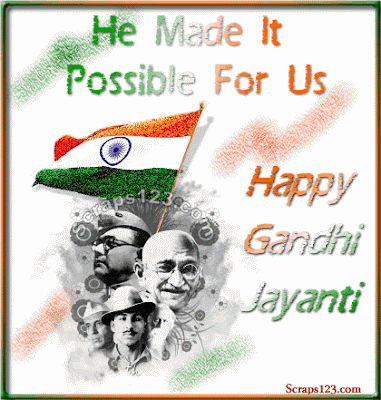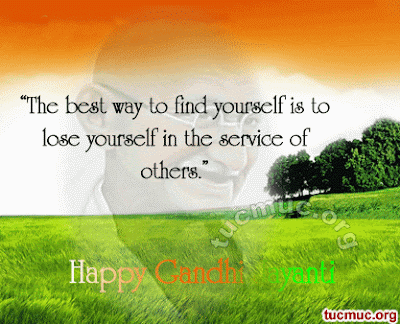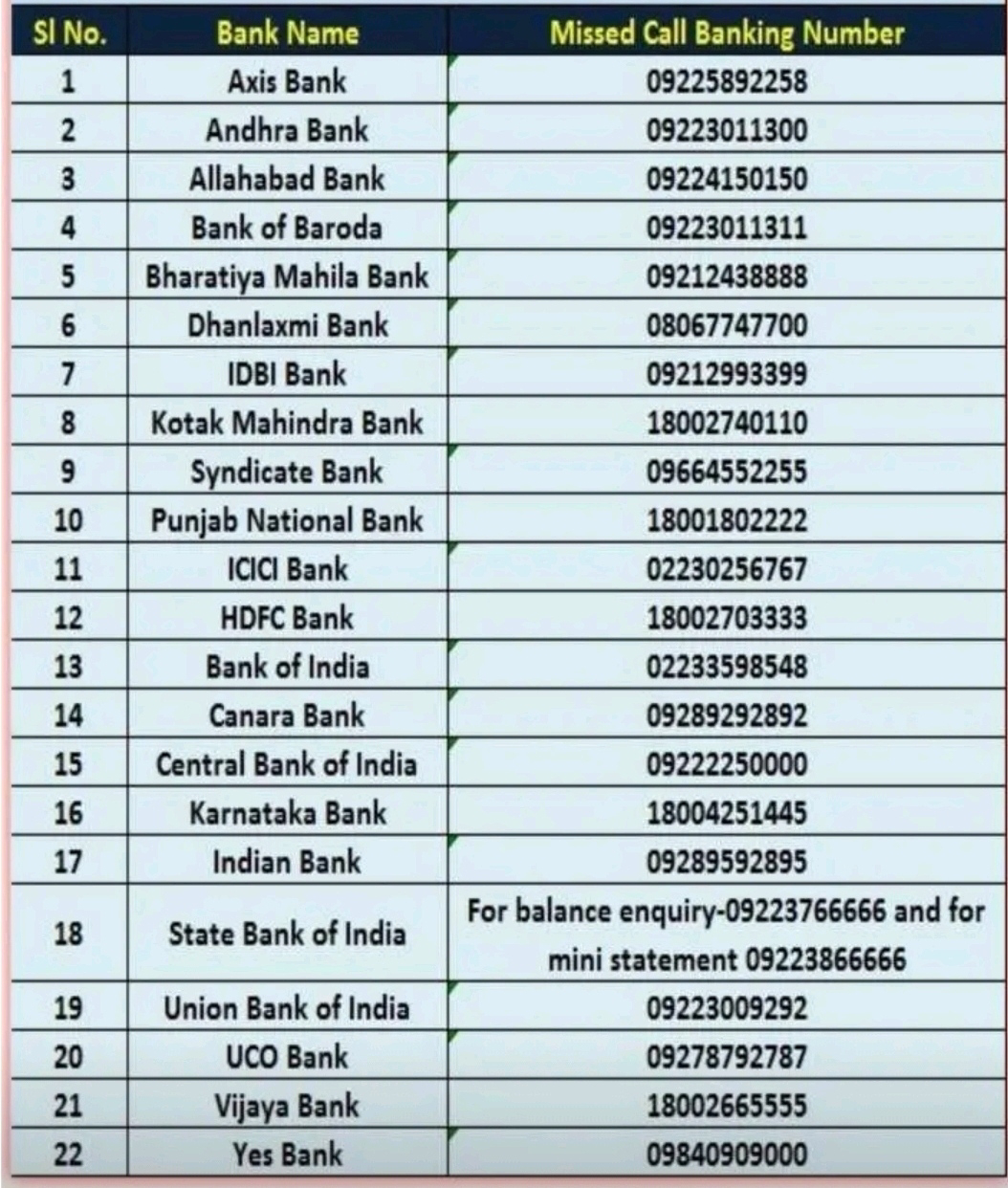Gandhiji was Born on 2nd October 1869.His Full Name is
Mohandas Karanchand Gandhi.Hi was Born in Porbander.We call him “Father of India.”Internationally this day is celebrated as the International Day of Non-Violence as Gandhiji was the preacher of non-violence. He is a symbol of peace and truth.He studied law in U.K and practiced law in South Africa. In his autobiography “My experiments with Truth” Gandhiji described his childhood and teen age years, his marriage with Kasturba at the age of 13 and a sheer dedication for his mother land. He has set an example of simple living and high thinking. He was against the addictions like smoking, drinking and non-vegetarianism.

Gandhiji was a pioneer of truth and non-violence. He started the ‘Satyagraha’ (non-violence) movement for the Indian freedom struggle. He played a very significant role in achieving independence for India from British rule. He proved to the world that freedom can be achieved through the path of total non-violence.
All the organizations throughout the country remain closed on this day. Special event is organized at Raj Ghat, New Delhi where Gandhiji was cremated. People do prayers, pay homage and sing Gandhiji’s favorite song “Raghupati Raghav Raja Ram, Patit Pavan Sita Ram …”.
He was interested in everything that concerns the individual or society. He is best known as the matchless political leader who evolved the new technique of “satyagraha”. His fight against untouchability and the notions of superiority and inferiority by birth are also fairly well known. For India, his greatest service was, perhaps, the emancipation of Indian women. While his stay in South Africa in the earlier part of his
life, he protested against the colonial and racial discrimination and the Asiatic (Black) Act and the Transvaal Immigration Act with the aid of a brilliant strategic move of starting a non-violent civil disobedience movement. He returned to India in 1915.
He was the person behind the Satyagraha Ashram in Ahmedabad and the Sabarmati Ashram, which became a platform for introducing long-needed social reforms such as ‘Harijan’ welfare, small-scale industries and self-reliance and rehabilitation of lepers. His fight to give equal rights to each and every person of the society irrespective of which strata they belong made him immortal among us. He tried to attained moksha by service to mankind. Gandhiji portrays a multi-faceted moral and spiritual messiah. His tireless endeavor to make people understand the basic happiness of life is to be happy with whatever you have, thus showing the only way to save the world. It is his philosophies and morals of life, which will make keep alive in our minds forever.
The year 1926 was declared by Gandhi to be his year of silence. His famous march to
Dandi in March 1930 started a countrywide movement to violate the Salt-Law.and Call as a
Dandhi Yatra. Gandhi was arrested on 4 May 1930, and the Government struck hard to crush the movement, but failed.
So Gandhi was set free on 26th January 1931; and following a pact between him and the British Viceroy, Lord Irwin (5 March 1931), he was prevailed upon to represent the Congress at the second Round
Table Conference in London.
Gandhi was completely disillusioned with the attitude of the British, which had renewed its policy of ruthless repression. As a result the Civil Disobedience Movement was resumed in January 1932.
Gandhi was in prison when the Communal Award was announced in August 1932, providing for the introduction of separate electorate for the Depressed Classes.
He opposed this attempt to divide the Hindu community and threatened to fast unto death to prevent it. He started his fast on 20th, September 1932. It created consternation in the country, but the situation was saved by the conclusion of the Poona Pact, which provided for special reservation of seats for the Depressed Classes in legislatures, but under joint electorate.
On 8th, May 1933 he announced a fast for 21 days for the Harijan cause. After coming out of prison Gandhi devoted himself exclusively to the cause of the ‘Harijans’.
The weekly Harijan now took the place of the Young India, which had served the national cause from 1919 to 1932. After 1934, Gandhi settled down in Sevagram near Wardha to form a new Centre for his enlarged Constructive Programme, which included Basic Education (1937), designed to bring about the universalisation of education.
In 1942, his ‘
Quit India’ slogan was to serve as the final signal to British dominion in India. The partition of India and Pakistan came as a personal shock to Gandhi.
Gandhi Jayanti Sms2013
1)
Follow the path
of truth Spread
Bapu’s great
Ideas to inspire
everyone
Happy Gandhi Jayanti
2)
You can chain me,
you can torture me,
you can even destroy this body,
but you will never imprison my mind
Happy Gandhi Jayanti..
3)
Its day of celebrations
Its day to value a special person
Person who is the cause of our nation
Who taught world the lesson of non-violence
Its Mahatma Gandhi..The Father of Nation !
4)
Ishwar Alla Tero Naam Sab Ko Sanmati De Bhagwan,
Boley Toh Gandhi Jayanti Aur Gandhigiri Zindabad,
Wish You Happy Gandhi Jayanti
5)
Always aim at complete harmony of
thought and word and deed.
Always aim at purifying your thoughts
and everything will be well.
Best Wishes on Gandhi Jayanti….
6)
Desh k liye jisne vilas ko thukraya tha,
Tyag videshi dhage usne khud hi khaadi banaya tha,
Pehen k kaath ki chappal jisne Satyagraha ka raag sunaya tha,
Desh ka tha anmol wo deepak jo Mahatma kehlaya tha…
Happy Gandhi Jayanti!
7)
You can chain me,
you can torture me,
you can even destroy this body,
but you will never imprison my mind
Happy Gandhi Jayanti.
Gandhi Jayanti Greetings2013
Gandhi Jayanti Images2013
Gandhi Jayanti Screps2013
 Gandhiji was a pioneer of truth and non-violence. He started the ‘Satyagraha’ (non-violence) movement for the Indian freedom struggle. He played a very significant role in achieving independence for India from British rule. He proved to the world that freedom can be achieved through the path of total non-violence.
Gandhiji was a pioneer of truth and non-violence. He started the ‘Satyagraha’ (non-violence) movement for the Indian freedom struggle. He played a very significant role in achieving independence for India from British rule. He proved to the world that freedom can be achieved through the path of total non-violence.




